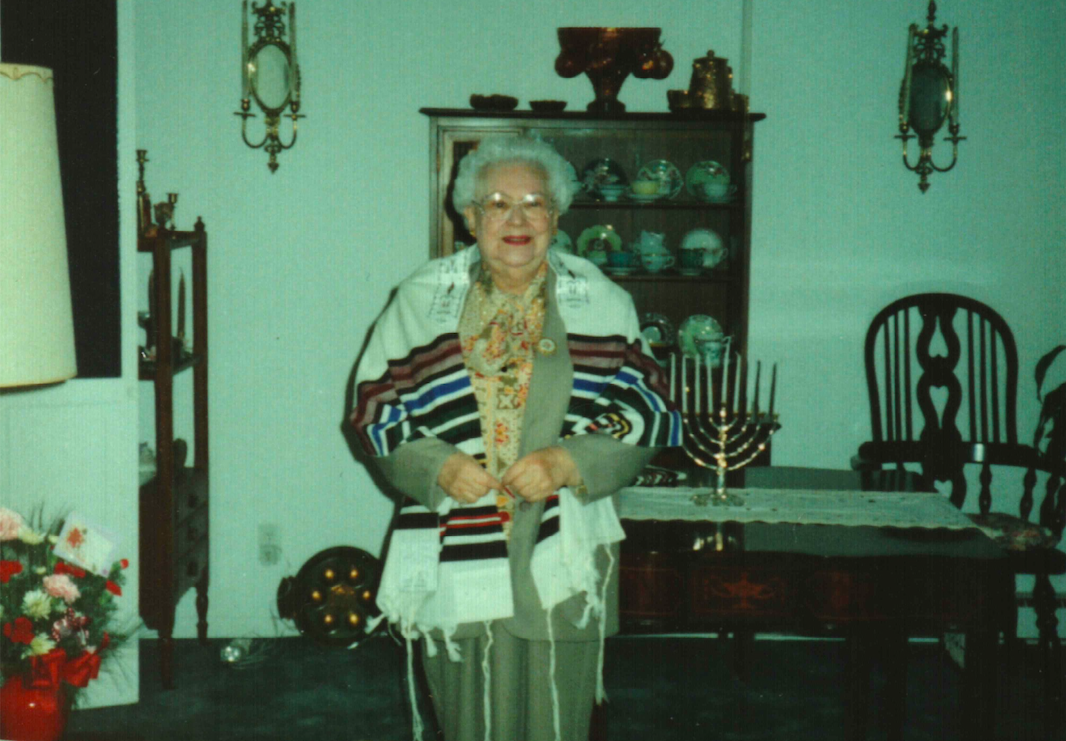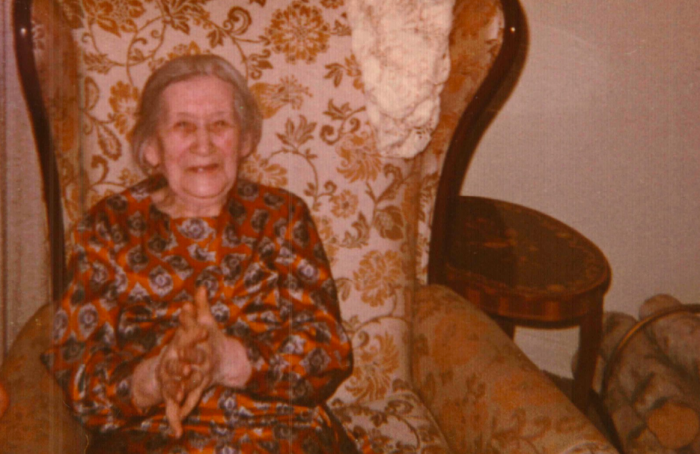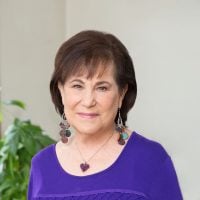In the ancient Jewish language of Yiddish, the word for grandmother is “Bubby,” and that’s what I always called her.
She was fun, brilliant, loving, determined, resilient, spoke six languages, had an operatic coloratura singing voice, told imaginative stories about her past, taught me how to swear in Yiddish, made potato pancakes from scratch that were just for me, and (can you tell?) I loved her.
She was religious, prayed from the sacred Hebrew prayer book I still have in my home, and at the same time, my bubby was an independent thinker and an empowered feminist.
The last two qualities made it interesting as I took her hand and entered the Orthodox synagogue to celebrate Rosh Hashanah (the Jewish New Year) and a week later, Yom Kippur (the day of Atonement).
My bubby may have been short and slight in stature, but even in those days, she was outspoken. As the women upstairs in the rafters of the synagogue “joined” the men sitting in the main part of the synagogue, she would pray, but in the off times, she would mumble with disapproval about the whole layout and ritual of making men the main entrée and women the measly side dish.
She didn’t agree with the male species being downstairs in the main part of the sanctuary and all the women herded upstairs. She said it was an example of inequality and gender discrimination.
She conveyed her feelings using the ancient language of Yiddish (the only language I knew how to speak before I went to kindergarten), and when she spoke, the guttural sound of this language made me pay attention and breathe in the imprint of her words and feminist philosophy.
She didn’t like that there were no major roles for women during the service, either. Men ran the religious service, and that was that.
My bubby gets my vote for the greatest rebel and feminist of all time. She was never afraid to think differently, believe differently, and still hold her head high that she belonged to the Jewish faith. It’s because of my bubby that I believe in fairness, equality, justice, and questioning anything that tells us that we must believe a certain way.
I also remember going to a Conservative synagogue with my parents, sister, uncle, aunt, and cousins. The conservative version of the High Holidays exuded more equality between female and male roles. All genders gathered in one large sacred space, and over time, women gained major roles that were equal (or almost equal) to men.
It took my mother’s entire childhood and adulthood to see this kind of equality manifest. The norm these days is to encourage both boys and girls to have a coming-of-age Bar (male) or Bat (female) Mitzvah at age 13.
When my mom was young, only males were given a Bar Mitzvah. Girls were not allowed to have a Bat Mitzvah.
All my mom had to do was wait a while. Okay…a long time. She was also a feminist, and when she was 76, guess what? She had her Bat Mitzvah. She proudly sang her portion of the Bible and had a glorious party afterward.

I guess coming of age can happen at any time, especially when you never give up on your dreams for a minute.
Then, there was me. Caught in the middle of liking parts of Judaism and disliking other parts.
In my bubby’s synagogue, people were just themselves. They may have been strict in the rituals, but they didn’t put on in any way. In my parent’s synagogue, it felt like a big fashion show during the High Holidays, and I couldn’t stand the farce.
Everybody seemed to be looking at everybody’s clothes and pocketbooks, and I wasn’t sure where prayers, religion, and spirituality fit in.
Isn’t this the holiday for feeling more humility and thinking about those who are less fortunate than us?
Isn’t this the holiday for deep reflection and committing ourselves to become a higher version of ourselves?
There was one aspect of the service that always hooked me, and it is a magnet for me to this day. The music. It fills my heart with its minor keys and penetrating melodies.
I especially love the heart-wrenching song, “Kol Nidre.” It is sung before the beginning of the evening service every Yom Kippur. The melody is hauntingly gorgeous.
It feels as if it is begging our one world to respect each other’s beliefs, become more tolerant and less prejudiced, and make a mindful decision to be curious and open about each other’s differences.
It feels as if “Kol Nidre” is encouraging all of humanity to offer the spirit of loving consciousness and to respect every religion and belief system.
I may be interpreting this beautiful piece of music too freely, but that is how this song makes me feel. In fact, I loved this song so much, I learned how to play it on my violoncello when I was in music college, and you know what I found out?
The composer of this piece, Max Bruch, wasn’t even Jewish. He was Protestant. See? We are all one.
In case you are curious about this magnificent piece of music, here is a version of Kol Nidre on YouTube played by the composer, Max Bruch, who is also the cellist.
Both my bubby and my mother were “strict Jews.” They adhered to the rituals—my mother perhaps more than my grandmother at times. As for me, I pulled away.
Although I acknowledge that my roots are Jewish, I am more spiritual than religious and am deeply ecumenical in my belief system.
Religion to me is respecting the sanctity of nature and walking the path of love, unity, kindness, peace, compassion, empathy, tolerance, justice, and forgiveness.
Every moment is an opportunity for rebirth, and so I wish you happy moments, happy weeks, and a happy new year, no matter what your religious or spiritual beliefs are in your heart of hearts.
As far as atoning for my sins and feeling the fear of God, I can’t relate to that fear. My God is a loving God. We are all children of the universe, and we are loved.
What do I do on Yom Kippur, the Day of Atonement? I usually use Yom Kippur as a private day. I don’t go to a temple or synagogue.
I go to the state park with my journal in hand and write down what I’d like to heal, what I would like to do better with my words, thoughts, actions, and reactions, and then I offer forgiveness to myself and to the people that hurt me, committing to start again with a clean slate in my soul.
I also recite the Buddhist Metta Meditation Prayer of Loving-Kindness:
“May I be happy.
May I be well.
May I be safe.
May I be at peace and at ease.
May you be happy.
May you be well.
May you be safe.
May you be at peace and at ease.
May the whole world be happy.
May the whole world be well.
May the whole world be safe.
May the whole world be at peace and at ease.”
~
Then, I turn to The Peace Prayer, attributed to St. Francis of Assisi:
“Lord, make me an instrument of Thy peace.
Where there is hatred, let me sow love.
Where there is injury, pardon.
Where there is error, the truth.
Where there is doubt, faith.
Where there is despair, hope.
Where there is darkness, light,
And where there is sadness, joy.
Grant that I may not so much seek
To be consoled, as to console.
To be understood, as to understand
To be loved, as to love
For it is in giving that we receive.
It is in pardoning that we are pardoned.
And it is in dying that we are born to eternal life.”
~
I now turn to the first five lines of a Cherokee Prayer:
“Earth teach me quiet–as the grasses are still with new light.
Earth teach me suffering–as old stones suffer with memory.
Earth teach me humility–as blossoms are humble with beginning.
Earth teach me caring–as mothers nurture their young.
Earth teach me courage–as the tree that stands alone.”
Before I leave the park for the day, I send a prayer of love, light, and healing to the world, look over the words I wrote in my journal, and then I take a longer look at Mother Teresa’s poem, Do it Anyway, with the first line custom-made for this day of atonement and every day.
“People are often unreasonable, irrational, and self-centered. Forgive them anyway.”
 Share on bsky
Share on bsky


Read 24 comments and reply